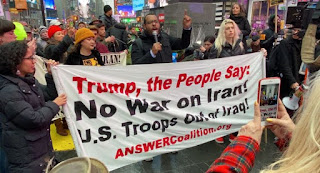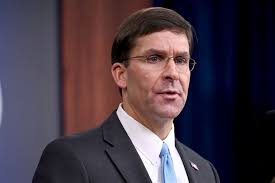Iraqi Parliament passed a resolution to expel US troops from
the country two weeks ago. However, Washington does not seem ready to leave the
country. According to some analysts, the US administration knows it very well
that leaving Iraq could become the preamble of complete exit from Middle East
and North Africa (MENA).
There is growing consensus that the presence of US troops in
MENA and South Asia, especially Iraq, is part of greater agenda of fragmentation
and establishing a “Feeble Middle East”. The strategy was formed during Bill
Clinton’s presidency and it was practically launched by George W. Bush.
The strategy has been applied in all the tactics and
policies of US foreign and defense policies in the past two decades. There
seems no ambiguity or disagreement between Democrats and Republicans regarding
the necessity of its implementation. Criticizing Donald Trump’s recent behavior
in the region by his Democratic rivals is related to the failure of the White
House in carrying out the strategy.
The US withdrawal from the JCPOA, exerting pressure for a
new deal or at least including new articles in the current deal, and insisting
to limit the Iranian influence in the region can be assessed in this regard.
Washington has made great investment in exploiting the
terrorist potential of Takfiri groups for the fragmentation in the region. The
presence of US troops in the region, under the pretext of the fight against
ISIS, is an issue of crucial importance for the White House, which it will not
easily ignore.
The United States has witnessed major d.efeats in the
political, military and intelligence areas by the axis of resistance. It has
failed in executing its plans, despite spending billions of dollars of US tax
payers. This became an important matter in Iraq and officials provided the
conditions for greater synergy with the axis of resistance, a move that
infuriated the White House.
Over the last four months, the US has put the tactic of
“creating a power vacuum based on social protest” on its agenda to weaken those
leaders who want complete expelling of US troops from the region. Washington
has sought to undermine the Iranian-Iraqi strategic unity through anti-Iran
slogans and prepare the ground for its troops to remain in Iraq.
The assassination of senior commanders of the resistance
movement, Major General Qassem Soleimani, and Abu Mahdi al-Muhandis, was the
same blunder that the theorists of the partition project were afraid of since
they considered it as the loss of all American possessions in the region.
Iraqis agreed upon the expulsion of US troops from the
country. The incident was the beginning of the new White House game in Iraq, US
administration made every effort to disrupt the implementation of the
resolution.
The US administration termed the resolution illegal and then
claimed that the parliament did not have a quorum at the time of voting. The US
administration also stated that under the Iraqi constitution, parliamentary
sessions will take legal form if more than half of the members plus one person
attend the session. This is exactly what happened during the voting.
When they failed in proving the allegation, US officials
resorted to bypassing the resolution by bringing up again the old disputes
between the Kurdish leaders and Baghdad.
The US is also trying to convince the UN Security Council of
the necessity of continuing its presence in Iraq to fight terrorism, by
transferring a number of ISIS leaders (trained at U.S. bases, especially in
Syria's Al-Tanaf and Al-Hasakah) to Iraq. In fact, several terrorist operations
recently carried out by ISIS elements in Iraq is an example of the US
hostility.
A new wave of violent protests has been staged in the past
few days, which are allegedly being directly led by the US embassy in Baghdad.
Washington is seeking to seize the opportunity and stabilize its presence in
Iraq by disrupting the process of appointing a new prime minister.
It seems that Iraq will witness some unrest due to enmity of
the US and its regional and European allies, including Britain, United Arab Emirates
and Saudi Arabia.






